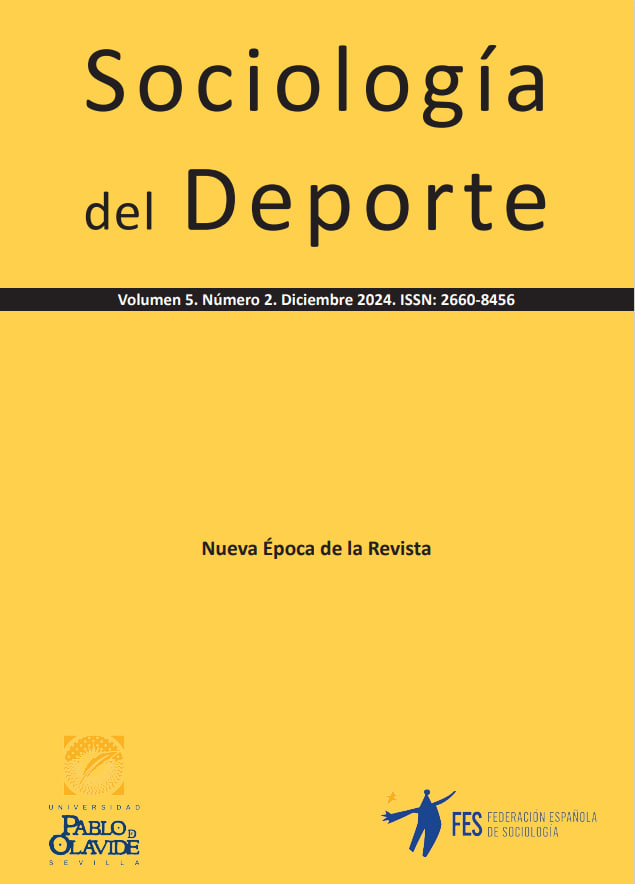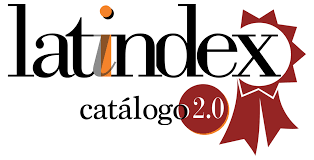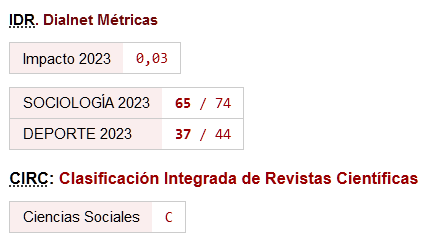Medición del rendimiento deportivo por país de acuerdo con las ventajas/desventajas naturales de las naciones competentes
DOI:
https://doi.org/10.46661/socioldeporte.11020Palabras clave:
Índices Estadísticos, Resultados Deportivos, Clasificaciones Deportivas, Medallas Olímpicas, Tokio 2020Resumen
Los resultados deportivos han sido importantes para las sociedades y sus gobernantes, dado su impacto en la economía, la imagen del país y las implicaciones políticas. Por ello, también ha sido de su interés encontrar métodos alternativos para afinar su medición (como los que ponderan en función de la población y la calidad de vida del país). En este trabajo se presenta una propuesta metodológica para medir los resultados deportivos a partir de los Juegos Olímpicos de Tokio 2020 (celebrados en 2021). Para ello, se crearon cuatro índices. El primero incluyó los diplomas olímpicos en el sistema de puntuación; el segundo contabilizó el número de atletas ganadores de medallas; finalmente, el tercer y cuarto índices ponderaron los resultados anteriores en función de la población y el ingreso per cápita. Nuestra propuesta permitirá destacar el desempeño deportivo de países cuyo ingreso y población no les permite destacar en los rankings tradicionales.
Descargas
Citas
Acquah-Sam, Emmanuele. 2021. "Developing sports for economic growth and development in developing countries". European Scientific Journal, 17(15): 172-216. https://doi.org/10.19044/esj.2021.v17n15p172
Becker, William; Giulio Caperna; María del Sorbo; Hedving Norlem; Eleni Papadimitriou and Micalea Saisana. 2022. "COINr: an R package for developing composite indicators". Journal of Open Source Software, 7(78): 4567. https://doi.org/10.21105/joss.04567
Bernard, Andrew; B. Busse, and R. Meghan. 2004. "Who wins the olympic games: economic resources and medal totals". The Review of Economics and Statistics, 86(1):413-417. https://doi.org/10.1162/003465304774201824
Brouwers, Jessie; Popi Sotiriadou and Veerle de Bosscher. 2015. "Sport-specific policies and factors that influence international success: The case of tennis". Sport Management Review, 18(3): 343-358. https://doi.org/10.1016/j.smr.2014.10.003
Contreras, Dante and Andrés Gómez-Lobo. 2006. "En busca del oro ¿Qué determina el éxito en competencias deportivas internacionales?" El Trimestre Económico, 73(290): 241-263. https://doi.org/10.20430/ete.v73i290.544
De Bosscher, Veerde; Paul de Knop; Maarten Van Bottenburg and Simon Shibli. 2006. "A conceptual framework for analysing sports policy factors leading to international sporting success". European Ssport Management Quarterly, 6(2): 185-215. https://doi.org/10.1080/16184740600955087
De Bosscher, Veerde; Paul de Knop; Maarten Van Bottenburg; Simon Shibli and Jerry Bingham. 2009. "Explaining international sporting success: An international comparison of elite sport systems and policies in six countries". Sport management review, 12(3): 113-136. https://doi.org/10.1016/j.smr.2009.01.001
Dubinsky, Yoav. 2024. "Branding a City as a sports town: A conceptual model based on Track Town USA". Journal of Global Sport Management, 9(1), 1-17. https://doi.org/10.1080/24704067.2021.2001354
Dutta, Soumitra, Bruno Lanvin and Sacha Wunsch-Vincent (Eds.). 2018. Global Innovation Index 2018. Energizing the World with Innovation. Cornell University, INSEAD & WIPO. http://efaidnbmnnnibpcajpcglclefindmkaj/https://www.wipo.int/edocs/pubdocs/en/wipo_pub_gii_2018.pdf
Freudenberg, Michael. 2003. "Composite Indicators of Country Performance: A Critical Assessment". OECD Science, Technology and Industry Working Papers, 16: 1-34. https://doi.org/10.1787/405566708255
González-Ruiz, Josue; Gema Torres-Luque, Antonio Roca-Cruz, Esther González and David Cabello-Manrique. 2018. "Relación entre inversión y resultados deportivos de España y el Reino Unido en los últimos 20 años (1996-2016)". SPORT TK-Revista Euroamericana de Ciencias del Deporte, 7(1): 157-164. https://doi.org/10.6018/322021
Halsey, Lewis G. 2009. "The true success of nations at recent Olympic Games: comparing actual versus expected medal success". Sport in Society, 12(10): 1353-1368, https://doi.org/10.1080/17430430903204892
Heinneman, Klaus. 1998. Introducción a la economía del deporte. Barcelona: Paidotribo.
Kiuppis, Florian. 2018. "Inclusion in sport: disability and participation". Sport and Disability, 21: 4-21. https://doi.org/10.4324/9780429505317-1
Knuepling, Louis and Tom Broekel. 2022. "Does relatedness drive the diversification of countries' success in sports?" European Sport Management Quarterly, 22(2): 182-204. https://doi.org/10.1080/16184742.2020.1770830
International Olympic Committee. 2021. Olympic Games: Tokyo. Retrieved October 19, 2023. https://olympics.com/en/olympic-games/tokyo-2020
Mohamed, Samir Abdel Latif Mostafa; Sameer Mohammed Khalil Sayyd, and Soliman Mohamed Ghreeb. 2024. "Inviting foreign direct investment for sports development projects in relation to economic development and development challenges". SPORT TK-Revista EuroAmericana de Ciencias del Deporte, 13: 39-39. https://doi.org/10.6018/sportk.624801
Moscoso-Sánchez, David, Alvaro Rodríguez-Díaz and Jesús Fernández-Gavira. 2015. "Elitist rhetoric and the sports gap. Examining the discourse and reality of sport in Spain". European Journal for Sport and Society, 12(1): 31-51. https://doi.org/10.1080/16138171.2015.11687955
Nardo, Michela; Michaela Saisana; Andrea Saltelli and Stefano Tarantola. 2008. Handbook on Constructing Composite Indicators. Methodology and User Guide. OCDE. https://www.oecd-ilibrary.org/economics/handbook-on-constructing-composite-indicators-methodology-and-user-guide_9789264043466-en
Praet, Lynn; Veerle De Bosscher; Sofie Smismans and Inge Derom. 2024. "Public Perceptions on Elite Sport's Societal Outcomes: A Validated Scale in a European Context". European Journal of Sport Sciences, 3(4): 8-17. https://doi.org/10.24018/ejsport.2024.3.4.174
Shasha, Wang; Abbasi, Babar Nawaz and Ali Sohail. 2023. "Assessment of Olympic performance in relation to economic, demographic, geographic, and social factors: quantile and Tobit approaches". Economic Research-Ekonomska Istraživanja, 36:1, 2080735, https://doi.org/10.1080/1331677X.2022.2080735
Shen, Liang. 2020. "Olympic Strategy, Nationalism and Legitimacy: The Role of Ideology in the Development of Chinese Elite Sports Policy in the First Reform Decade, 1978-1988". The International Journal of the History of Sport, 37 (1):26-40. https://doi.org/10.1080/09523367.2020.1737021
Ugolini, Donatella; Mónica Neri; Alfredo Cesario; Stefano Bonassi, Daniele Milazzo; Luca Benatti; Luisa Lapena y Patricio Pasqualetti. 2012. "Scientific production in cancer rehabilitation grows higher: a bibliometric analysis". Support Care Cancer, 20: 1629-1638). https://doi.org/10.1007/s00520-011-1253-2
United Nations Development Program. 2020. UNDP 2020 Statistics. Retrieved November 21, 2023. https://hdr.undp.org/sites/default/files/data/2020/2020_Statistical_Annex_Table_1.xlsx
Wood, Robert. 2010, "Comparison of Weighted Ranking Systems". Topend Sports, May 2010. Retrieved December 12, 2024. https://www.topendsports.com/events/summer/medal-tally/rankings-weighted.htm
World Bank. 2021. World Bank Indicators. Retrieved November 24, 2023. https://data.worldbank.org/indicator/NY.GNP.PCAP.PP.CD

Descargas
Publicado
Cómo citar
Número
Sección
Licencia
Derechos de autor 2024 ALBERTO VALLEJO PEÑA

Esta obra está bajo una licencia internacional Creative Commons Atribución-NoComercial-CompartirIgual 4.0.








